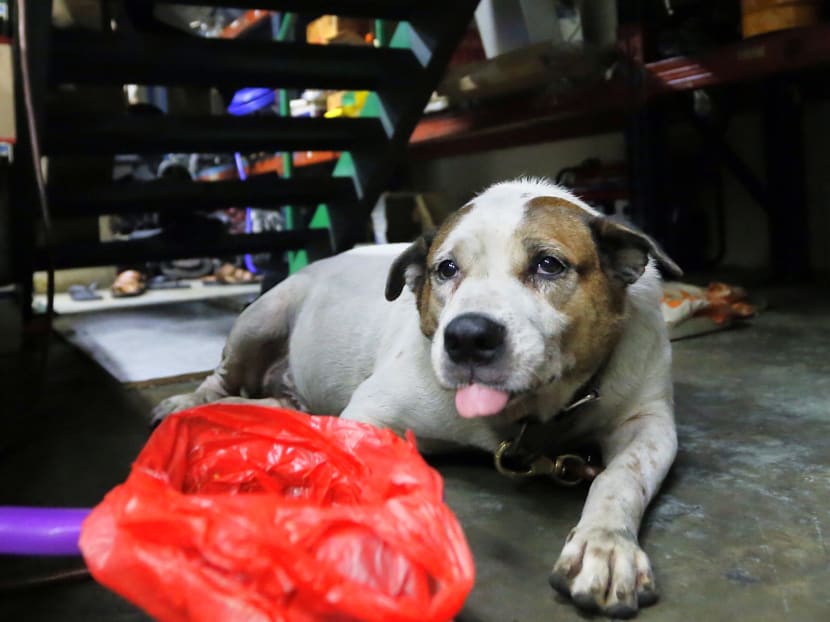Activists say AVA not doing enough in case of chained dog
SINGAPORE — A chained pet dog at Paya Ubi Industrial Park has sparked off yet another conflict between animal welfare groups and the authorities here, with activists saying the Agri-Food & Veterinary Authority of Singapore (AVA) has “failed to protect the (dog’s) rights”.

Brutus the dog tied with a two-metre leash to a small flight of stairs in a Paya Ubi Industrial Park workshop. Photo: Ernest Chua/TODAY
SINGAPORE — A chained pet dog at Paya Ubi Industrial Park has sparked off yet another conflict between animal welfare groups and the authorities here, with activists saying the Agri-Food & Veterinary Authority of Singapore (AVA) has “failed to protect the (dog’s) rights”.
The AVA, on the other hand, said it is necessary for pet dogs to be restrained for their own safety as well as that of the public.
A group petitioning for a ban on tethering dogs first brought up the case of Brutus — a name the group has given to the dog housed at Super Modern Car Accessories at Paya Ubi Industrial Park — to the AVA’s attention in July, raising concerns that it was “restrained on a five-foot leash all day and night”.
“Chaining Brutus in a deplorable and dangerous environment should constitute animal cruelty,” said Ms Anita Chew, who also started an online petition to legislate against chaining dogs. It has since received more than 2,500 supporters.
Ms Chew, whose offer to care for the dog was declined by its owner, said the dog was tied up outside the workshop within an area filled with metal scrap before AVA officers visited the workshop on Sept 28.
“We doubt the dog is exercised properly, he is slow and wobbly in his walk, which can be due to the lack of exercise from the years being tied up,” she added.
Following the AVA’s visit, its owner, who wanted to be known only as Mr Teo, had moved the dog into the workshop, and tied it with a two-metre leash to a small flight of stairs behind a desk.
Mr Teo told TODAY he had adopted the dog from a friend seven years ago as a newborn puppy, and had been caring for it in the workshop since.
Due to its “aggressive personality”, the dog needs to be chained up to prevent it from attacking customers and dirtying the industrial area.
“Several years ago, the management (of the industrial park) complained that he was pooping all over. He also got into fights with other dogs. One time, he was injured so badly I thought he was going to die ... we later chained him up,” Mr Teo said in Mandarin.
He added that the dog is fed roasted pork and taken out for walks twice daily.
In response to queries, the AVA said Mr Teo had, under the authority’s advice, relocated the dog to ensure that it has “sufficient room to move around”. It is now tethered with a leash “long enough such that the dog is able to lie down, stretch and move around the desk area”.
The AVA said: “Straying dogs may pose a threat to public safety. Pet owners who choose to tie or tether their pet dogs … should ensure that the area where the dog is tethered is safe and comfortable, and sufficiently sheltered and ventilated. (It) should also be clean and have adequate space for the dog to lie down, stretch and move unimpeded within the confines of the restraint.”
However, Ms Chew and fellow activists felt that the AVA was not doing enough in Brutus’ case. “AVA had an opportunity to send out a deterrent message to dog owners who do not provide adequate care for their dogs but failed to do so in this case,” the activists said in an email to TODAY.
While acknowledging the “different and difficult” role that AVA plays in ensuring public safety, several animal welfare groups believe that education and further dialogue among stakeholders are key in reaching a middle ground.
SOSD president Siew Tuck Wah noted that the authorities have been working more closely with activists over the past four years, citing the Animal Welfare Legislation Review in 2012 which involved consultation with various stakeholders.
“Animal lovers uphold very high standards of animal welfare ...The authorities have a more difficult role … they not only answer to the animals, but are more concerned with public safety. Hence, the authorities’ standards may sometimes be the minimum, which animal welfare groups may not think is enough,” he said.
The Society for the Prevention of Cruelty to Animals’ (SPCA) executive director Corinne Fong said animal welfare groups are continually engaging with the authorities to “arrive at more humane practices over time”.
Ms Fong felt that the AVA should review the issue of chaining dogs, but noted that owners also have the responsibility for training their dogs to ensure the animals’ safety.
Action for Singapore Dogs founder Ricky Yeo also found the AVA slow to educate communities in industrial areas on sterilisation and care for stray dogs.
“They prefer to work on a knee-jerk reaction of responding only to complaints by trapping and then culling,” he said.
Animal Concerns Research & Education Society president Louis Ng, however, felt that legislation may not be feasible if enforcement is a challenge.
“If we have a law against chaining dogs, who will police it? It is important for education and awareness to build up so we don’t need to legislate these things ... I don’t think there is that big a gap (between the authorities and activists), they have different ways of getting to the same place,” he said.
According to Ms Fong, the SPCA came across 768 alleged abuse and alleged neglect cases involving animals in 2014. Between January and August this year, it encountered 561 alleged abuse and alleged neglect cases.






